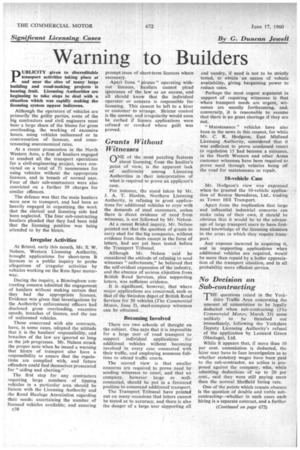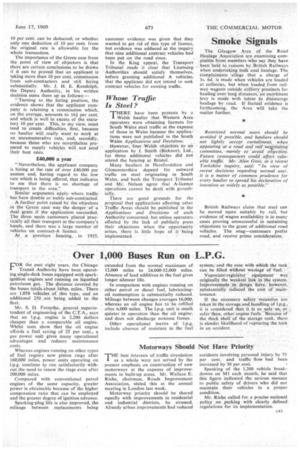Warning to Builders
Page 74

Page 77

If you've noticed an error in this article please click here to report it so we can fix it.
pUBLICITY given to discreditable transport activities taking place at and near the sites of many large building and mad-making projects is bearing fruit. Licensing Authorities are beginning to take steps to deal with a situation which was rapidly making the licensing system appear ludicrous.
Although the operators of vehicles are primarily the guilty parties, some of the big contractors and civil engineers must bear a large share of the blame for gross overloading, the working of excessive hours, using vehicles unlicensed or in contravention of licences, and countenancing uneconomical rates.
At a recent prosecution in the North Western Area, a firm of hauliers engaged to conduct all the transport operations for a civil-engineering project, were convicted on a total of 71 summonses for using vehicles without the appropriate licences, and in breach of normal user. Four of their sub-contractors were also convicted on a further 59 charges for similar offences.
The defence was that the main hauliers were new to transport, and had been so heavily engaged in organizing the work that the clerical and licensing side had been neglected. The four sub-contracting hauliers pleaded that they had been told that the licensing position was being attended to by the hirers.
Irregular Activities
At Bristol, early this month, Mr. S. W. Nelson, Western Licensing Authority, brought applications for short-term B licences to a public inquiry to probe allegations of irregular activities by vehicles working on the Ross Spur motorway.
During the inquiry, a Birmingham contracting concern admitted the engagement of hauliers without making certain that they had the appropriate licences. Evidence was given that investigations by the Authority's enforcement officers had disclosed gross overloading, excessive speeds, breaches of licence, and the use of unlicensed vehicles.
Those concerned with site contracts, have, in some cases, adopted the attitude that it is the hauliers' responsibility, and breaches of the law are ignored so long as the job progresses. Mr. Nelson struck the proper note when he issued a warning that hirers of transport also have a responsibility to ensure that the regulations are complied with, and future offenders could find themselves prosecuted for "aiding and abetting."
The first step for any contractors requiring large numbers of tipping vehicles in a particular area should be liaison with the Licensing Authority and the Road Haulage Association regarding their needs; ascertaining the number of licensed vehicles available; and ensuring c38 prompt issue of short-term licences where necessary.
Apart from " pirates " operating without licences, hauliers cannot plead ignorance of the law as an excuse, and all should know that the individual operator or concern is responsible for licensing. This cannot be left to a hirer or customer to arrange. Stricter control is the answer, and irregularity would soon be curbed if licence applications were refused or revoked where guilt was proved.
Grants Without Witnesses
rINE of the most puzzling features
about licensing, from the haulier's point of view, is the apparent lack of uniformity among Licensing Authorities in their interpretation of what is required to prove an applicant's case.
For instance, the stand taken by Mr. J. A. T. Hanlon, Northern Licensing Authority, in refusing to grant applications for additional vehicles to cope with the demands of steel customers, unless there is direct evidence of need from witnesses, is not followed by Mr. Nelson.
At a recent Bristol inquiry, Mr. Nelson pointed out that the question of grants to carry steel for the big companies, without evidence from them except in the form of letters, had not yet been tested before the Transport Tribunal.
Although Mr. Nelson said he considered the attitude of refusing to send witnesses "unfortunate," he believed that the self-evident expansion of the industry, and the absence of serious objection from British Road Services, plus supporting letters, was sufficient evidence.
It is significant, however, that where major applications are concerned, such as that of the Swindon depot of British Road Services for 30 vehicles (The Commercial Motor, June 3), steel-company witnesses can be obtained.
Becoming Involved
There are two schools of thought on the subject. One says that it is impossible for a large user of road transport to support individual applications for additional vehicles without becoming involved in every case connected with their traffic, and employing someone fulltime to attend traffic courts.
The second view is that smaller concerns are required to prove need by sending witnesses to court, and that no company, however large or wellconnected, should be put in a favoured position to command additional transport.
The Transport Tribunal have pointed out on many occasions that letters cannot be tested as to accuracy, and there is also the danger of a large user supporting all and sundry, if need is not to be strictly tested, to obtain • an excess of vehicle availability, giving bargaining power to reduce rates.
Perhaps the most cogent argument in support of requiring witnesses is that where transport needs are urgent, witnesses are usually forthcoming, and, conversely, it is reasonable to assume that there is no great shortage if they are not.. " Maintenance" vehicles have also been in the news in this respect, for while Mr. C. R. Hodgson, East Midland Licensing Authority, considered that it was sufficient to prove continued resort to regulation 15 had become a nuisance, in the North Western and other Areas customer witnesses have been required to prove need through vehicles being off the road for maintenance or repair.
10-vehicle Case
Mr. Hodgson's view was expressed when he granted the 10-vehicle application of Boston Stevedores, Ltd., trading as Tower Hill Transport.
Apart from the implication that large and influential industrial concerns can make rules of their own, it should be obvious that it would be to the advantage of large transport users to have-firsthand knowledge of the licensing situation in the areas in which they require transport.
Any expense incurred in acquiring it, and in supporting applications when additional vehicles are required, would be more than repaid by a better appreciation of the transport situation, and in all probability more efficient service.
No Decision on Sub-contracting
T"questions raised in the Yorkshire Traffic Area concerning the amount of commission to be legally deducted when sub-contracting (The Commercial Motor, March 25) seem unlikely to be thrashed out immediately, following the Yorkshire Deputy Licensing Authority's refusal of the application by Leonard Green (Haulage), Ltd.
While it appears that, if more than 10 per cent. commission is deducted, the hirer may have to face investigation as to whether statutory wages have been paid to the sub-contractor, no action is proposed against the company, who, while admitting deductions of up to 20 per cent., said they were still paying more than the normal Sheffield hiring rate.
One of the points which remain obscure is the question of double and treble subcontracting—whether in such cases each hiring is a separate contract, and a further 10 per cent, can be deducted; or whether only one deduction of 10 per cent, from the original rate is allowable for the whole transaction.
The importance of the Green case from the point of view of objectors is that there are certain conclusions to be drawn if it can be proved that an applicant is taking more than 10 per cent, commission from sub-contractors and still hiring substantially. Mr. J. H. E. Randolph, the Deputy Authority, in his written decision sums them up as follows:—
" Turning to the hiring position, the evidence shows that the applicant company is retaining a commission which, on the average, amounts to 161 per cent. and which js well in excess of the statutory 10 per cent. This, in my view, must tend to create difficulties, first, because no haulier will .really want to work at an unremunerative rate, and, secondly, because those who are nevertheless prepared to supply vehicles will not send their best ones.
£40,000 a year.
"Nevertheless, the applicant company is hiring at the rate of over £40,000 per annum and, having regard to the low rate which is being offered, that indicates to me that there is no shortage of transport in the area."
Similar arguments apply where traffic has been double or treble sub-contracted. further point raised by the objectors
in the Green case was the danger of a•dual grant if the application succeeded.
The three main customers placed practically all their transport in the company's hands, and there was a large number of vehicles on contract-A licence. • At a previous hearing, in 1955, customer evidence was given that they wanted to get rid of this type of licence, but evidence was adduced at the inquiry that nine additional contract vehicles had been put on the road since.
In the King appeal, the Transport Tribunal made it clear that Licensing Authorities should satisfy themselves, before . granting additional A vehicles; that the applicant did not intend to seek contract vehicles for existing traffic.
Whose Traffic Is Steel?
THERE have been protests by a 1 Welsh haulier that Western Area operators were obtaining licences for South Wales steel traffic at the expense of those in Wales because the applications were not published in the South Wales Applications and Decisions.
• However, four Welsh objeCtors to an application by I. Smith (Bicknor), Ltd., for three additional " vehicles did not attend the hearing at Bristol.
Many hauliers in Herefordshire and Gloucestershire depend for outward traffic on steel originating in South Wales, and both the Transport Tribunal and Mr. Nelson agree that A-licence operations cannot be dealt with paroch ially. •
There are good grounds for the proposal that apPlications affecting other Traffic Areas should be published in the Applications and DecisiOns of each Authority concerned, but unless operators affected by the lack of publicity press their objections when the opportunity arises, there is little hope of it " being implemented. '
Smoke Signals
The Glasgow Area of the Road Haulage Association are examining complaints from members -who say they have been held to ransom by British Railways when undertaking bulk coal haulage. The complainants :allege that a charge of is. 6d. is made when vehicles are loaded at collieries, but when loaded, from railway wagians outside colliery precincts for hauling over long distances, an exorbitant levy is made with intent to discourage haulage by road. If factual evidence is forthcoming, the Area will take the matter further.
Restricted normal users should be avoided if possible, and hauliers should not lightly accept curtailment,_ when appearing at a road and "rail negeidting committee, merely to avoid objection. Future consequences could affect valuable traffic. Mr. Alan Goss, at a recent Yorkshire inquiry, said; "In view of recent decisions regarding normal user, it is a matter of common prudence for every haulier to spread his declaration of intention as widely as possible."
British Railways claim that steel can be moved more suitably by rail, but evidence of wagon availability is in many cases proving unsuccessful in sustaining objections to the grant of additional road vehicles. The snag—customers prefer road, and receive prime consideration.
























































































































